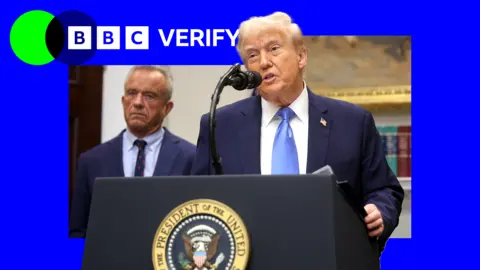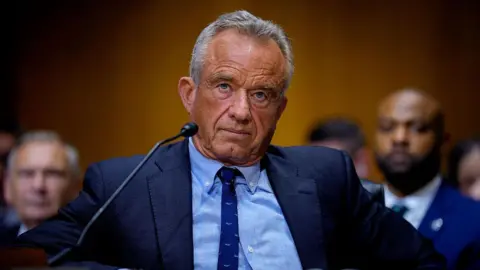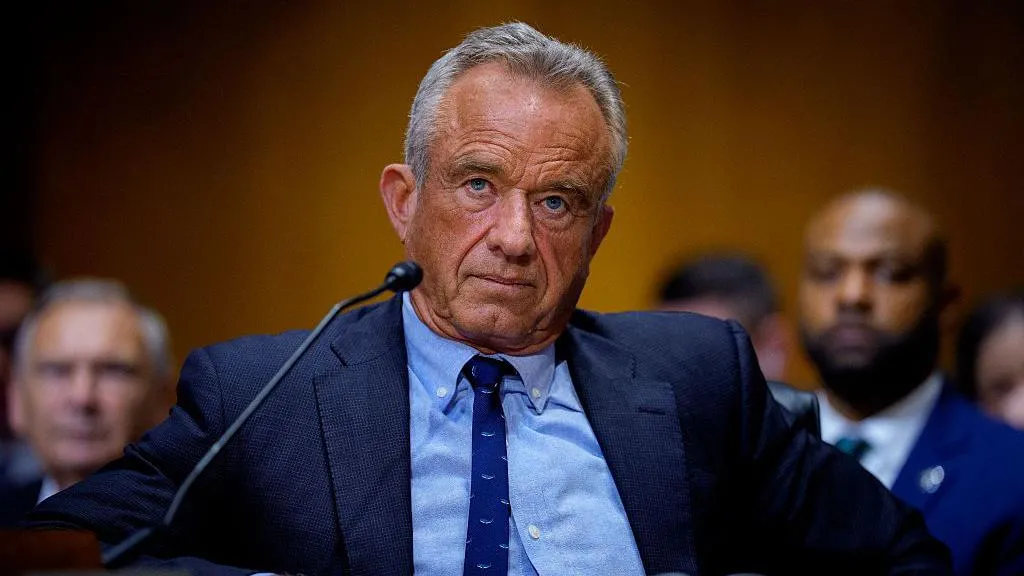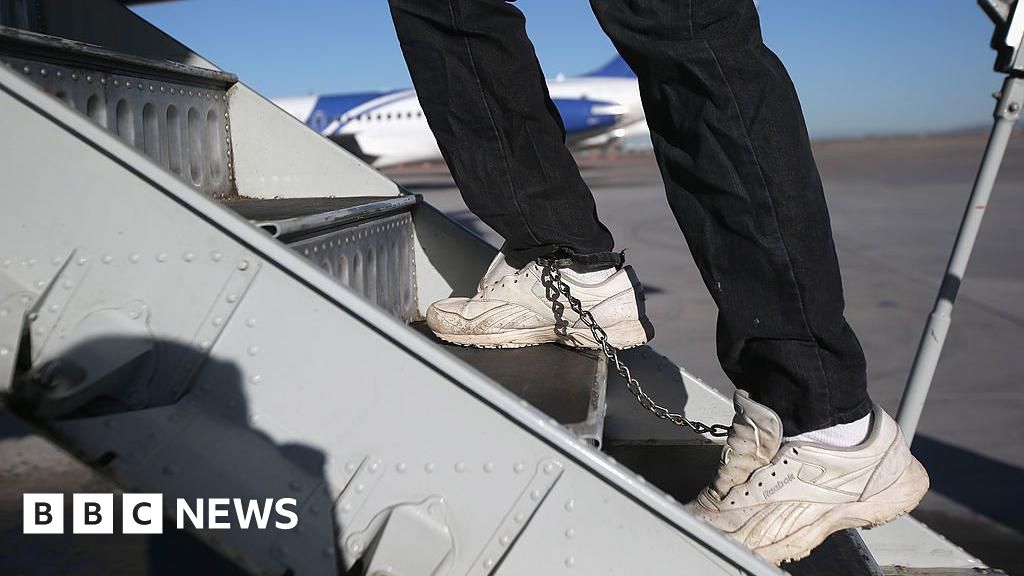Matt Murphy, Kayleen Devlin and Lucy GilderBBC Verify
 Getty Images
Getty ImagesUS President Donald Trump has attracted condemnation from health experts, after he sought to claim that there was a link between the widely used painkiller Tylenol and autism.
Accompanied by his Health Secretary Robert F Kennedy Jr, Trump said that doctors would soon be advised not to recommend the drug – called paracetamol in some other countries, including the UK – to pregnant women.
The claims have been attacked by medical experts. The American College of Obstetricians and Gynaecologists said the announcement was “unsettling” and not based on “reliable data”, while the UK’s National Autism Society called Trump’s statement “dangerous, it’s anti-science and it’s irresponsible”.
BBC Verify has looked at some of the allegations Trump and Kennedy made during their news conference at the White House.
Is Trump correct that US autism diagnoses are rising?
During the event, Trump listed a number of statistics which he said showed that autism diagnoses in the US have risen rapidly over the past two decades.
Firstly, the US president claimed that incidence has increased from around “one in 10,000…probably 18 years ago” to “one in 31” by 2025.
The final statistic quoted by Trump – that autism rates have risen to one in 31 – is correct. Data from the Centers for Disease Control and Prevention (CDC) in 2022 found that level of diagnoses among eight year olds across 16 US states.
While that rate has grown from 18 years ago, it did not grow by anything like the figure cited by Trump. While there was no figure for 2007 – the year cited by Trump – in 2006 the CDC estimated the rate of autism in the US population to be 1 in 110. In 2008 it was 1 in 88.
Most experts say rising rates of autism can primarily be attributed to changes in how the condition is diagnosed, as well as greater recognition of the condition and more people being tested.
Trump also claimed on Sunday that California has a “more severe problem” with autism than other states surveyed by the CDC.
The CDC estimated that in 2022, about 1 in 12 eight-year old boys in California had autism – the highest rate for boys in the study across 16 US states.
But the agency noted that the state has funded a local initiative training hundreds of local paediatricians “to screen and refer children for assessment as early as possible, which could result in higher identification” of autism.
Should the MMR vaccine be taken separately?
Another claim made by Trump is around the effects of the mumps, measles and rubella (MMR) vaccine. The US president claimed that the vaccinations should “be taken separately” rather than as a combined shot and that “it seems when you mix them, there could be a problem.”
Experts fear that if parents refrain from getting their children vaccinated as a result of his unfounded claims, it risks the re-emergence of diseases like measles.
The discredited idea that childhood vaccines are linked to autism first gained mainstream attention after a paper published in 1998 in the medical journal The Lancet by British doctor Andrew Wakefield.
Wakefield was later found to have financial conflicts of interest – including that some of his test patients connected with a lawsuit against vaccine companies – and the UK’s General Medical Council (GMC) found that he falsified his results. The research paper was retracted and Wakefield was struck off by the GMC in 2010.
Multiple studies since have found no link between the MMR vaccine and autism. The most recent – a high-quality study from Denmark in 2019 looked at 657,461 children, and concluded that the data did not support the MMR vaccine causing or triggering autism.
On its website, the US CDC recommends that two doses of the combined MMR vaccine are given to children, starting with the first dose at 12-15 months and the second between the ages of four and six.
 Getty Images
Getty ImagesAccording to the UK government, there is “no evidence” that the jabs should be taken separately. It notes that any decision to do so “would be experimental”.
This year, the US has seen the highest cases for measles in more than three decades. According to the CDC, 1,491 cases have been confirmed so far. Three people have died.
“President Trump produced no evidence that the current immunisation schedule in the States was harmful and no evidence that giving the combined MMR vaccine was unsafe,” David Elliman – associate professor of children’s health at University College London – said.
“Proponents of a link between MMR vaccine and autism cite the 1998 research paper in the Lancet, whose first author was Andrew Wakefield,” he added. “In fact, the authors of the paper clearly stated in the paper that they had not proven a link but suggested more research should be done. That research has been done, and no evidence of a link has been found.”
Experts also say that allowing time between jabs means children are more likely to contract diseases in the interim or that they are more likely to miss appointments if there are multiple shots.
Are autism rates lower among Amish people?
Trump cited the Amish as a group within the US who have “virtually no autism” within their community.
The Amish typically live in remote communities and refuse to adopt many features of modern life, which can include a suspicion of modern pharmaceuticals. Trump suggested – without providing evidence – that a low rate of Tylenol use within the group could have led to a lower rate of autism.
There are relatively few studies on autism rates within the Amish community. Many children are diagnosed in school – but most Amish drop out of school after eight grade, around 14-years-old.
“I think it’s very very unlikely that there are no autistic people among the Amish,” Eva Loth, professor of cognitive neuroscience at King’s College London told BBC Verify.
“The question is how many population studies were carried out with the Amish? And are Amish people likely to seek a diagnosis? So there are a number of reasons why reported numbers may be low but that doesn’t mean that no cases exist.”
In one 2010 study, a team of geneticists found autism occurred in approximately one in 271 Amish children. The research screened 1,899 children across two large Amish communities in Ohio and Indiana.
However, it’s worth noting that research into this topic is limited, and we haven’t found any studies which suggest a link between low immunisation rates and autism diagnosis among Amish people.
Trump made a similar claim about low levels of autism in Cuba – claiming that Tylenol supplies are low on the island as the reason.
It’s not clear what President Trump was basing the assertion on. BBC Verify could find no official Cuban statistic and the World Health Organization (WHO) has noted that the “prevalence of autism in many low- and middle-income countries is unknown”.
What has Trump said about autism previously?
Trump has intermittently expressed concern over rising rates of autism in US children for almost 20 years. In 2007 he first publicly suggested that he believed that there was a link between vaccines and the increasing prevalence.
The president has expressed interest in Kennedy’s work since at least 2017, when Kennedy said that Trump had asked him to lead a vaccine safety taskforce. Seven years later, Kennedy – who was then polling at around 5% – dropped his bid for the presidency and endorsed Trump.
In a leaked call with Kennedy during the election campaign and in which the Republican tried to coax the independent to support him – Trump was heard discussing discredited claims about the health risks of childhood vaccines. After the election Trump announced him as his choice to lead the department of health and human services, with a mandate to “make America healthy again”.
However, during his first term Trump did support some vaccine campaigns. During a 2019 measles outbreak in the US he said that people “have to get the shots. Vaccinations are so important”, and it was his administration that oversaw the rapid development and early roll-out of Covid-19 vaccinations.
Additional reporting: Joshua Cheetham





